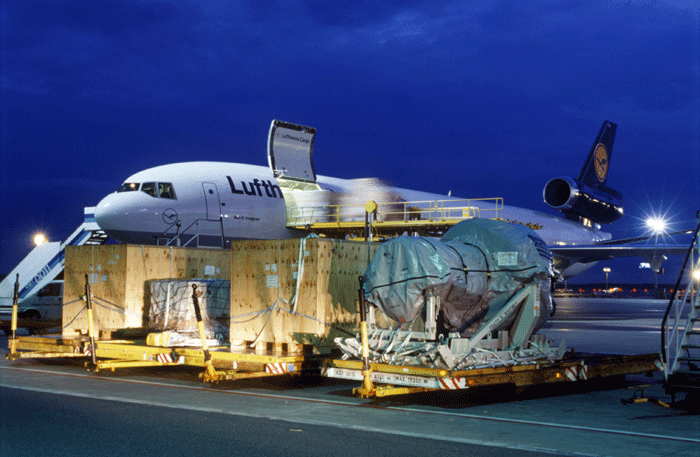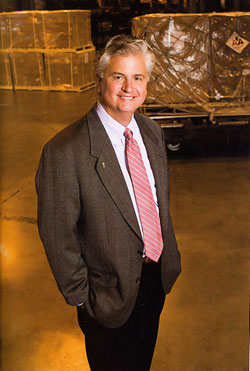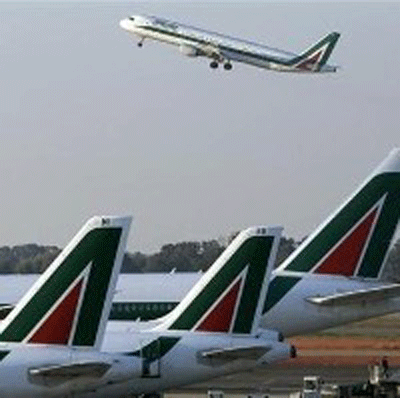

 |
 |
|
| |
||
|
Vol. 8 No. 1 WE COVER THE WORLD Wednesday January 7, 2009 |

Dateline USA—No doubt about it the big immediate issue for air cargo in 2009 is air cargo screening. How to screen effectively while taking care to not shut down the flow of goods, many believe depends on how well the TSA’s Certified Cargo Screening Program (CCSP) works. But concern about equipment costs in a dreadful business climate has many in air cargo wondering why TSA is not taking a broader role in the screening of freight?
In case you missed it, all USA
air cargo faces a mandated deadline in a little over three weeks on February
3 that will profoundly impact the way this industry operates in the future.
The U.S. Congress Homeland Security Bill that
will eventually require 100% physical screening of all U.S. belly cargo by
August 3, 2010, kicks off demanding 50% cargo screening by February 3, 2009.
While everybody in air cargo has agreed that
the law demanding 100% screening will be tough, that problem is still better
than a year and a half away.
 However
the actual problem is more severe on February 1st, 2009, rather than August
2010. Since consolidations and bundled pieces from shippers and forwarders
must come loose on February 1st, 2009. This effort is extremely intense on
handling increased loose pieces throughout the network
However
the actual problem is more severe on February 1st, 2009, rather than August
2010. Since consolidations and bundled pieces from shippers and forwarders
must come loose on February 1st, 2009. This effort is extremely intense on
handling increased loose pieces throughout the network
Mr. Klaus Holler, Vice President of the Americas
for Lufthansa Cargo states, “On February 1st, 2009, the industry will
change the way business has been conducted for decades. The removal of consolidations
from the forwarder or the shipper that are not screened, will require loose
handling at the air carrier. This impact will be felt worldwide as origin,
transit and destination stations handle an increase in loose cargo. The way
cargo is accepted on February 1st, will be the challenge, 100% screening will
fall into place without issue if this initial challenge is surpassed.
“Our efforts and intensive coordination
with our partners have focused on this challenge.
“Lufthansa Cargo stands ready to assist
our partners and continue intensive discussions in order to find the most
effective security and operational processes possible to meet the TSA and
US Congressional law. Consequently, the challenge of screening at 100% begins
February 1st, 2009.”
Today in the here and now, many shippers and
air forwarders and others as well wonder what the 50% screening mandate will
have on the industry.
TSA created the Certified Cargo Screening Program
(CCSP).
But CCSP is voluntary, leaving forwarders to
somehow shoulder costs on their own.
If that sounds unbelievable, at least one airline
is willing to endorse the idea.
"The disruption if they (forwarders) don't
join the CCSP will cost supply chain participants far more than they will
have to pay to be compliant,” Dave Brooks, American Airlines Cargo President
said, adding:
 “The
level of interest in the CCSP program has proven that the thinkers in the
forwarding community are on board with the concept that they will always be
better off if they can do their own screening.
“The
level of interest in the CCSP program has proven that the thinkers in the
forwarding community are on board with the concept that they will always be
better off if they can do their own screening.
“In fact, AA is training several CCSP
participants on how to do their own air cargo screening here at our Flagship
University near headquarters in Dallas.
“Those that complain—dare I say,
whine, about the cost and why the government isn't paying for it ought to
have spent more time hitting the bricks in Washington before the law was passed.
“The legislative debate is over; the TSA
really has no control over the deadlines we are facing other than to shut
us down if we are late.”
But confusion cannot be ruled out as a prime
driver as the deadline draws near and that has some industry watchers wary
of worse case scenarios.
“I have spoken to our offices,”
said one medium sized forwarder who also said that “in this contentious
atmosphere right now, what we get back is that in almost every city and airport
there are conflicting instructions.
“There is no real telling just what will
what will happen on February 3.
“In point of fact no one can predict with
absolute certainty how the new rules will impact air cargo.
“Air cargo companies still need to think
about smart and cost-efficient solutions and there are options
“Companies can collaborate by pooling
their shipments for screening at a number of airports or have shippers, cargo
terminals or even the airlines achieve the mandated directives.
“There is one question that so far has
not been answered,” said another forwarder source.
“Why doesn’t the TSA perform screening,
just as the agency does with screening of luggage and passengers?
“No matter who does the screening, the
liability issue should a catastrophic incident occur is unresolved.
“The best way to insure workable global
air cargo security is for everyone to utilize best practices and maybe even
more importantly for the dialogue to ramp up between nations for a major exchange
of ideas as all of us work to get security right.
“Everyone’s future depends on getting
cargo security right.”
The only carrier that has outlined in clear
detail what to expect is Lufthansa Cargo.
In a letter to its customers, Klaus Holler noted
the gravity of the situation and its impact on air cargo stating:
“The full impact of this mandate will
not be fully understood by all of us until after we begin the arduous task
of adhering to the complex requirements and adjusting our operational processes.”
Lufthansa Cargo taking a partnership approach
to our knowledge is also the first airline to spell into in detail what to
expect on February 1.
“Our operational plan is prepared to limit
the impact on our operations and also our partners,” Mr. Holler said.
“At time of booking, the customer must
clearly indicate whether the shipment will be delivered screened or unscreened.
“Upon arrival at our facility, cargo will
be matched with the appropriate certifications, quality assurance and security
program guidelines (SSI) by a dock coordinator.
“Currently, we do not intend to change
our Latest Acceptance Times (cut-offs) for both screened and unscreened cargo.
“This may be subject to change later on depending on the volume of unscreened
cargo we receive at our facilities.
“Cargo tendered to us by a certified CCSF
may be tendered loose or consolidated as it is today.
“Cargo booked for passenger aircraft which
is not screened must be tendered loose and must have the AWB indicating the
actual number of pieces and cannot include any SLAC counts.
“Not accepted for passenger aircraft are
consolidated skids, BUP’s, shrink-wrapped freight and the banding of
pieces of any kind, if the cargo does not come from a certified CCSF.”
Mr. Holler goes on to detail fees, rates and
surcharges that as this point can be accessed from any local Lufthansa cargo
office.
Maybe Lufthansa has created a template for the
entire industry not unlike their single rather heroic effort to bring air
cargo front and center late last year in New York at an intensive one-day
security seminar.
But supposing that the thinkers in air cargo
have gone to bed on any one subject, limiting the possibility of advancing
our industry, is echoed by Dave Brooks who closes all of this with another
thought.
“If we want to get worked up about something—something
that transcends the commercial issues—it's why do we tolerate more than
one security standard for air cargo?
“Pity the forwarders who now must deal
with an even greater divide between what can go on a freighter and what can
go on a passenger aircraft.
“Where is the aviation security wisdom
that diminishes the risk of moving an IED or nuclear device aboard a freighter?
“If we were to synchronize our air cargo
security programs, the air cargo supply chain might become more streamlined
and maybe, maybe we'd have a shot at getting back some of the business we've
lost to every other mode.
“And the skies would be safer, to boot.”
Geoffrey
|
 “Alea
iacta est,” – the dice is tossed said the ancient Romans.
“Alea
iacta est,” – the dice is tossed said the ancient Romans.